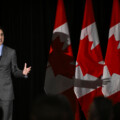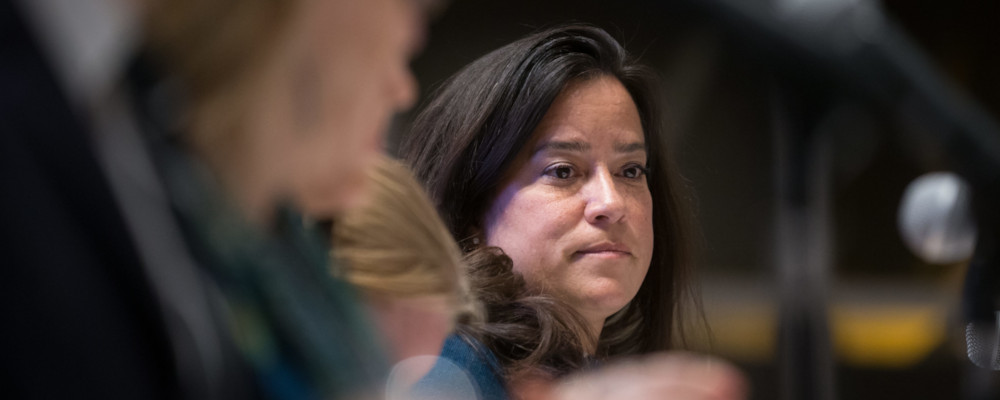Jody Wilson-Raybould was and is perplexing to many in the political class. While many partisans and analysts kept trying to figure out what her angle was during the SNC-Lavalin affair, it now seems evident that her situation was simply that rare case of a politician with a strong sense of personal morality who upholds their core principles regardless of the consequences. In her recent memoir, “Indian” in the Cabinet, she describes the dynamics of political corruption around the SNC-Lavalin affair. This is the hook which likely drew many Canadian political players and commentators to buy and read the book. But there’s much more to it than just that.
The SNC-Lavalin affair is symptomatic of a more endemic problem of our politics. In her memoir, Wilson-Raybould decries the excessive partisanship of federal politics in general and of the Liberal Party in particular. Her analysis is largely informed by her experience in the Liberal cabinet, and in particular by the way in which the Prime Minister’s directives around change, transparency, and reconciliation were all intended to be interpreted through a hyper-partisan and cynical lens that rendered them morally vacuous and often practically meaningless. Her story also points the way to the most authentic solution to this hyper-partisanship problem.
Wilson-Raybould’s story is unique in many ways. As Canada’s Minister of Justice and Attorney General of Canada, she was the first Indigenous person and only the third woman to hold this office. In “Indian” in the Cabinet, Wilson-Raybould describes herself as being deeply rooted in her own Indigenous community and in the virtues that her community embodies and reinforces. She emphasizes a sense of inherited obligation to leadership and service and an unshakeable belief in the significance of words. Her admirers have often described her as a deeply principled individual. That is true but is not the full picture. She was not just acting from personally selected values or a personal sense of right and wrong. Rather, she describes her moral action as being the product of teaching by and connection with a family and community that reinforced and affirmed a longstanding community-based tradition of moral ideas and practices. She explained this in particular during her testimony before a Parliamentary committee on February 27, 2019 when she said:
“I was taught to always be careful what you say because you cannot take it back. I was taught to always hold true to your core values and principles, and to act with integrity. These are the teachings of my parents, my grandparents, and my community. I come from a long line of matriarchs, and I’m a truth-teller in accordance with the laws and traditions of our big house. This is who I am, and this is who I always will be.”
The rootedness demonstrated by these comments stands in sharp contrast to the rootlessness that increasingly characterizes so much of Western society. We do not have the same connections to family and to communities of shared values that most peoples have had for most of human history. We inhabit a world of declining communal ties, in which individual moral or immoral action is seen as the product of individual heroism or individual failure instead of as the outgrowth of shared communal values.
The broader decline of community connection that we are seeing around us seems to be leading people to identify more sharply with political and partisan categories, as a kind of proxy for true community. Many people today are much more defined by their political party affiliation or chosen political ideology than by their neighbourhood, their faith, their cultural community, or their family. This was not always the case, and it is potentially dangerous. Ideological identifiers or political parties might fulfill some of the functions of traditional community, but they necessarily do not provide the same forms of personal support or motivation to moral action that traditional communities do.
It is easy to see how and why a person who is rooted in a community of virtues separate from politics would be more likely to engage in moral action which challenges existing norms of political behaviour. Rootless politicians who identify primarily with political parties and labels instead of with normal human communities are more likely to have their sense of right and wrong shaped by partisan interest. If the Liberal or Conservative Party is your primary community, then you might misidentify its interests as being synonymous with the common good. But if your primary identity is as part of some prior community, you are more likely to be able to critique or act apart from your political party to the extent that that acting apart is taught and reinforced by an external community.
Our rootless and individualistic societies often fail to notice the reality of how dependent people are on community, and the inevitable degree to which community shapes moral or immoral action. History shows that moral action apart from communal structures of moral connection is difficult and rare. Most people will do either great or horrible things if they are in a communal context which pushes them in that direction.
Some have hypothesized that the way to reduce the stifling impact of partisanship in our system is by weakening the power of political parties. This might, however, miss the point. If politicians are rootless as individuals, then weakening political party power won’t reduce the intensity or pernicious power of partisan identification. Note how in the United States, where political parties exercise much less direct power over individual legislators than in Canada, the stifling impact of sharp partisan identification is still very much a problem. The solution to hyper-partisanship might therefore need to involve a broader effort to strengthen community ties as an alternative to hyper-partisan identification.
If politicians are rootless as individuals, then weakening political party power won’t reduce the intensity or pernicious power of partisan identification.
During the 42nd Parliament, Wilson-Raybould was not the only politician to have invoked the virtues taught and practised in an Indigenous community as the basis for rejecting hyper-partisanship. While opposing his own government’s bill legalizing euthanasia and assisted suicide (C-14), Robert-Falcon Ouellette argued:
“We are making profound changes in concepts surrounding life, which cannot be undone in the future. In the Indigenous tradition and philosophy, we are required to think seven generations into the future. If I am wrong and there is no connection between Attawapiskat and physician-assisted dying or suicide, if the average person does not see a connection and communities do not see a greater stress, then I will gladly say I was wrong; but if there is an impact, which is caused by the valorization of suicide, then what?”
Interestingly, Ouellette was in this case opposing legislation that had been proposed by Wilson-Raybould. People who are rooted in their own communities do not necessarily agree with each other, and different Indigenous communities obviously vary significantly in their traditions and practises just as other communities do. But the point is still that in the case of both Ouellette and Wilson-Raybould a sense of rootedness in community and tradition helps to explain moral actions or positions taken that deviate from the ordinary logic of partisan politics. For both Ouellette and Wilson-Raybould, their primary attachment was to their Indigenous community and not to the Liberal Party of Canada.
For strategic advantage, politicians often try to claim membership in and affiliation with as many identity groups as possible. But having some identity marker as a Catholic, a Muslim, an Indigenous person, etc. is not the same as genuine rootedness. Rootedness in this context describes a state of being fully part of a community that reinforces virtues and challenges vices and claims a kind of prior attachment ahead of party or ideology. Identity and rootedness are not the same thing.
It is important to also consider the risks and downsides associated with calls for greater rootedness among politicians. Strengthening local community ties might weaken partisanship. It might also sometimes increase other forms of division, with people opposing each other on the basis of communal identity as opposed to partisan identity. Stronger local communities would ideally exist within some context of overall national community and certain shared political values.
A person’s rootedness in particular community can also be a source of vice instead of virtue. In the extreme, the rootedness of members of Cosa Nostra is an example of how membership in communities of shared practices and values can be a source of social division and extreme violence. And yet these potential problems all seem to prove the overall point that community membership is a powerful motivator to moral or immoral action. Our accounts of moral and immoral action in politics should pay more attention to the communities that people are a part of and how those communities shape their character. Wilson-Raybould’s story also shows how rootedness in one community does not mean opposition to or disinterest in other communities—her book contains several examples of identifying and appreciating quotations or other pieces of wisdom that came from other communities and traditions.
Overall, Jody Wilson-Raybould’s story suggests that we often approach the problems of hyper-partisanship and political corruption in the wrong way. Stemming from the typically Western individualistic frame, we are thinking too much about promoting individual moral action apart from community and about weakening political parties themselves, rather than thinking about the need to strengthen rootedness among elected officials and to elect people who are themselves strongly rooted in communities that valorize virtuous behaviour. Stronger community and enhanced rootedness may turn out to be the best real antidote to corruption and hyper-partisanship.
And finally, Wilson-Raybould’s story underlines the fact that Indigenous communities have deeply rooted traditions which can constructively contribute to national conversations on all possible subjects. Meaningful reconciliation necessarily requires all of us to take an active interest in the substance of these traditions.
Recommended for You

The Notebook by Theo Argitis: Carney’s One Big Beautiful Tax Cut, and fresh budget lessons from the U.K.

Ginny Roth: How vacant liberal nationalism left Canada worse off than George Grant even imagined

Peter Menzies: Justin Trudeau’s legislative legacy is still haunting the Liberals

‘Our role is to ask uncomfortable questions’: The Full Press on why transgender issues are the third rail of Canadian journalism



